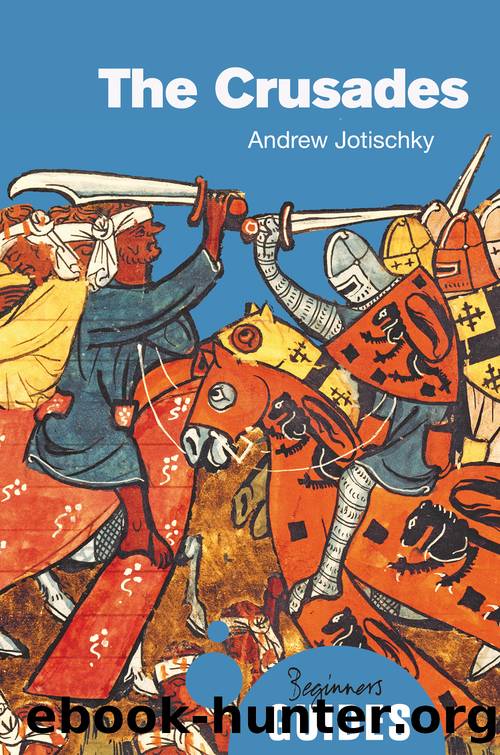The Crusades by Andrew Jotischky

Author:Andrew Jotischky
Language: eng
Format: epub
Tags: History, Beginners Guide, Crusades, Middle Ages, Medieval, Christian history, Islamic history, Conflict, War
Publisher: Oneworld Publications
Published: 2015-01-06T00:00:00+00:00
Figure 5 The capture of Acre on the Third Crusade, 1191. The leading knight in the picture is the king of France, Philip Augustus. (Source: From a fourteenth-century manuscript of the Chroniques de France, British Library Royal MS 16 G.VI, f. 352v.)
Saladinâs reputation fell temporarily as a result of the Third Crusade. Although he had clung on to Jerusalem, he had been outfought more than once by Richard. He continued to press his fellow Muslims to greater efforts for the jihad, but there were already signs that these ideals were dwindling. His brother Al-âAdil, who succeeded him, would show little of Saladinâs fervour for holy war. Yet Saladin had achieved what no previous Muslim ruler had done since the seventh century, and he impressed contemporaries among both Muslims and Christians by the force of his personality. He had critics among Muslims, as he has among modern historians, but he was also loved and respected. Whatever the route by which he came to power, from 1183 onwards, he appeared to embody the ideals of the good Muslim ruler. As his contemporary biographer Ibn Shaddad listed them, his virtues as a ruler and a man conformed to the essentials of Islam: he was regular in his observance of both prayer and fasts; he gave alms generously and instituted an alms tax in Egypt; and he was unyielding in his pursuit of holy war. What impressed Christians as well as Muslims was his quality of mercy. At Acre, when a group of newly arrived pilgrims from the West fell into his hands as prisoners, he freed them and let them go on their way to Jerusalem out of respect for the piety that had brought them so far. When the mother of a Christian child who had been captured by his soldiers came to him in tears, he ordered the release of the child and paid the ransom out of his own pocket. Incidents such as these made him an authentically heroic figure, much lauded as a âchivalrousâ character in his own day. His reputation was fully revived by nineteenth-century romantics in the West and by Arab nationalists in the Middle East, and in the twenty-first century he far outstrips his mentor, Nur ad-Din, in fame.
Download
This site does not store any files on its server. We only index and link to content provided by other sites. Please contact the content providers to delete copyright contents if any and email us, we'll remove relevant links or contents immediately.
| Africa | Americas |
| Arctic & Antarctica | Asia |
| Australia & Oceania | Europe |
| Middle East | Russia |
| United States | World |
| Ancient Civilizations | Military |
| Historical Study & Educational Resources |
Magic and Divination in Early Islam by Emilie Savage-Smith;(1530)
Papillon by Henry Charrière(1408)
Bohemians, Bootleggers, Flappers, and Swells: The Best of Early Vanity Fair by Bohemians Bootleggers Flappers & Swells- The Best of Early Vanity Fair (epub)(1394)
Ambition and Desire: The Dangerous Life of Josephine Bonaparte by Kate Williams(1380)
Twelve Caesars by Mary Beard(1309)
Operation Vengeance: The Astonishing Aerial Ambush That Changed World War II by Dan Hampton(1155)
What Really Happened: The Death of Hitler by Robert J. Hutchinson(1152)
London in the Twentieth Century by Jerry White(1139)
The Japanese by Christopher Harding(1129)
Time of the Magicians by Wolfram Eilenberger(1118)
Twilight of the Gods by Ian W. Toll(1110)
Lenin: A Biography by Robert Service(1071)
The Devil You Know by Charles M. Blow(1018)
A Social History of the Media by Peter Burke & Peter Burke(966)
Freemasons for Dummies by Hodapp Christopher;(960)
Napolean Hill Collection by Napoleon Hill(936)
Henry III by David Carpenter;(915)
The Churchill Complex by Ian Buruma(904)
The Rise and Triumph of the Modern Self by Unknown(904)
